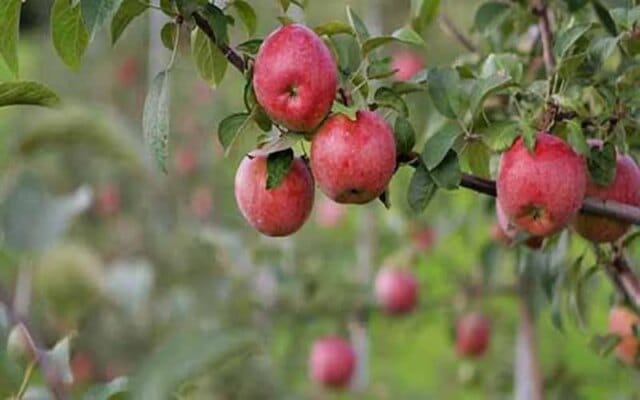Srinagar, Jul 15: A growing crisis threatens Kashmir’s high-density apple plantations as widespread use of substandard trellis systems raises concerns over long-term viability.
Orchard infrastructure across the region is increasingly being built with poor-quality galvanized iron (GI) pipes, often in violation of the IS Standard 1239. Many of these pipes are less than 1.5 mm thick and weigh under 10 kg, making them structurally unsound for high-density orchards designed to last up to 50 years, industry experts say.
GI pipes, as per Indian Standard (IS) 1239 standards, are categorised into three classes based on their wall thickness and durability. Class A, or light class, has a wall thickness of approximately 2.0 mm and a lifespan ranging from 5 to 8 years when buried in soil. Class B, known as medium class, features a thickness between 2.65 mm and 4.05 mm, offering a longer service life of 8 to 15 years. The heaviest and most durable, Class C, has a wall thickness between 3.25 mm and 4.85 mm, with an expected lifespan of 15 to 20 years under similar conditions.
Experts say most trellis systems in Kashmir use Class A or even lower-grade pipes, despite their unsuitability for structural support. In contrast, pre-stressed concrete poles (PSCPs)—used globally for similar plantations—offer a lifespan of over 70 years. “The trellis system used here may not withstand a moderate wind”, said Ashiq Ali, Founder and Ailal Agro Private Ltd. He said that in European countries, a robust trellis system is used that lasts for decades.
Quality Control Lapses
Market sources say many GI pipes used in orchards fall below the Indian Standard (IS) weight benchmark of 5.5 kg per metre for 60 mm diameter. Pipes as thin as 1.5 mm are commonly sold, raising the risk of structural failure, especially in areas vulnerable to snow and high winds.
“Only Class C pipes with a minimum 4 mm wall thickness and 250 GSM zinc coating are fit for use in soil,” said a horticulture engineer who declined to be named. He said that the orchards with the current terries system could not last for many years.
Farmers Left Unaware
Many orchardists say they are unaware of the quality standards and rely on suppliers and developers. “We trusted the supplier and the scheme,” said Bashir Ahmad, a grower from Shopian. As pipes deteriorate, the trained apple trees risk collapse, potentially leading to large-scale losses and rendering entire orchards non-productive. The government, however, has outrightly rejected the use of substandard GI pipes. During the last Assembly session, Tral MLA Rafiq Ahmad Naik moved a cut motion seeking an explanation from the government over the use of substandard GI pipes in high-density apple orchards. In response, the government said it had not permitted the establishment of such orchards.








